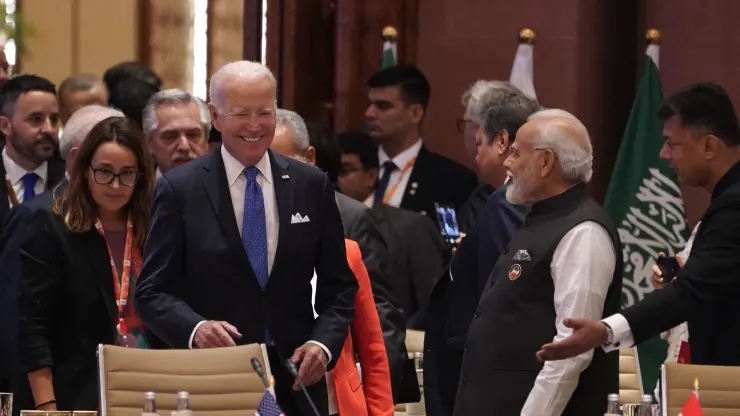India’s rise as the “Voice of the Global South”
By Rohan Jayaraman ’25
Earlier this September, India hosted the 18th annual G20 Summit in New Delhi, where leaders of the 20 most powerful economies and governmental organizations discussed various global issues and drafted a declaration that addressed world problems. India’s proactive initiative to create meaningful change at the G20 summit allowed the nation to emerge as the “Voice of the Global South.” This shift in influence potentially signifies a change in power within the BRICS alliance, especially in light of China’s economic decline and President Xi’s absence from the summit.
While countries assume the G20 presidency over the course of a year, the summit at the end of a G20 presidency gives leaders a chance to review the program and create a declaration outlining long-term policies and agendas that will carry into the subsequent years. During this year’s summit, discussions focused on green programs, climate financing, and infrastructure development. One of the anticipated issues of the summit was the Russia-Ukraine crisis, with countries still deeply divided 18 months after the initial conflict. Furthermore, Russian President Vladimir Putin decided not to attend the summit, instead sending his foreign minister Sergei Lavrov, who also filled in for Putin at the BRICS summit at the end of August. Another notable absence from the summit was Chinese President Xi Jinping, who instead sent his Premier Li Quang to lead the Chinese delegation. Although China provided no specific reason for Xi’s absence, many speculate that Xi missed the meeting either due to discontent over his leadership domestically or the escalating tensions between Indian and Chinese soldiers at the Galwan border. In the long term, Xi’s absence could signify the fact that the G20 forum does not serve China’s interests as the nation gradually invests more time in strengthening the BRICS alliance. Nevertheless, these absences allowed India to carry out their initiative without this opposition.
At the summit, India was able to push an initiative in line with their domestic goals whilst strengthening foreign ties. At the previous G20 Summit, held in Bali, discussions were more oriented to the Russia-Ukraine war and strengthening US-China relations. This included a declaration condemning the war in Ukraine in the “strongest of terms,” which was unpopular among Russian officials and the Chinese who wanted to maintain diplomatic ties with Russia. However, since India has strong relationships with both Russia and the West, it proposed a tamer declaration that did not directly condemn Russia, thus protecting its relationship with both parties. This declaration was met with Chinese and Russian approval, with Indian Foreign Minister Subrahmanyam Jaishankar stating that China was “supportive” of the decision, “finding common ground on all issues.” While there are tensions between India and China, it is important that India fosters this relationship with its second-largest trading partner and co-leader of the BRICS alliance.
The summit in Delhi ultimately allowed India to establish an agenda that addresses their internal objectives. These objectives included a focus on climate goals, reaffirming the Paris Agreement, and facilitating finance for low-income countries and their transition to sustainable energy sources. India utilized its G20 presidency to emphasize the funding needed in the energy transition of the “Global South,” highlighting the climate action components in the SDG (Sustainable Development Goals)-focused agenda. Consequently, the G20 pledged $5.9 Trillion to green financing requirements for developing countries. As India advocated for the Global South, they managed to assert their global influence by steering the summit to the needs of the developing countries around them.
Furthermore, India was able to steer the agenda to infrastructure development and the establishment of the India-Middle East-Europe economic corridor (IMEC), which seeks to rival China’s Belt & Road Initiative (BRI). While the BRI has made significant investments in the Middle East, including a $400 billion partnership with Iran, its expansion is threatened by the IMEC’s presence. The corridor is expected to stimulate economic development through enhanced connectivity and economic integration. The investment in infrastructure allows India to strengthen ties with the UAE, its third most significant trading partner, and potentially enhance bilateral partnerships with the West. India was also able to strengthen its engagement with Africa by welcoming the African Union into the G20, furthering India’s relationship with its member states. This move is both symbolic of the “Global South’s” influence and a diversified G20 platform and also a strategic, long-term partnership opening India to the economic opportunity of Africa. Some have suggested that the IMEC could be extended to Africa, aligning with Europe’s intention of a Trans-African corridor and India’s objective of engaging with Africa in trade, technology, and infrastructure development.
India’s agenda throughout the G20 summit solidified its geopolitical status as a key player in global policy-making while creating a progressive agenda that addressed its domestic and international goals. The summit allowed India to portray itself as an advocate for developing nations, underscoring the broader shift in power to the “Global South.” India now plays an interesting role as a nation with significant influence both in the G20 and the BRICS alliance. This combination will allow them to shape agendas and global policies to their domestic benefit whilst simultaneously fostering robust foreign relations. As the G20 heads to Brazil, India looks to reinforce their agenda, amplifying the “Voice of the Global South” in creating policies that encourage bilateral trade, climate-conscious discussions, and economic growth.



